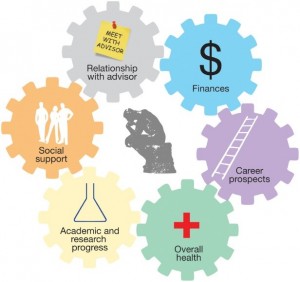At an event in April 2016, sponsored by Hutch United and the Association for Women in Science, Emma Williams, Associate Ombud at UW, shared effective strategies for managing conflict.
First, we know that being a postdoc is highly stressful. You have many deadlines, demands, funding uncertainties and questions about your future. Research shows that people who make decisions from a stressed mental state tend to have a narrower perspective about their options. On the other hand, approaching a problem from a positive mindset – one of gratitude, generosity, and grace – can improve creative problem-solving and open up previously unseen options. In light of this, we offer a few tips the next time you experience even a minor conflict:
- Take a deep breath and a break. While it is important to address conflicts soon, before they fester, it is also critical to calm down before responding. Taking a little time, even 24 hours, will often give you perspective and allow you to explore options for responding.
- Prepare, prepare, prepare. Ask yourself: what would you like to see happen? And, how can you make that most likely?
- Consider the ‘who, what, when, where, and why’.
- Who: Is there someone who can help you have a better discussion? Bringing in another person – perhaps from your research group or from your mentoring team – can both offer support or another perspective on the conversation.
- What: What should this conversation be about? If it is a seemingly small thing – or series of small things – in the research group, what does this pattern of behavior really signal to you? What’s really the overall concern?
- When/where: When and where are the best place to have a productive conversation? Find a neutral territory and a time when you can both focus.
- Why: What are your goals for the conversation? What are the results or outcomes you want to see?
- Practice. Ask a peer or another trusted colleague to have a mock discussion with you. Practice the tough questions or responding to difficult scenarios, and practice remaining calm, respectful, and clear about your goals.
- Step away when you need to. If the conversation does go sideways, take a break. Acknowledge the conversation isn’t productive now and you’ll come back to it. You can name a time/day when you want to pick it up again so it doesn’t linger further. You can also send an email follow up to clarify your goals for the conversation, and be descriptive about what is making it difficult to have this conversation (e.g. “the conversation broke down when…”), and then ask for what you need (e.g. “it would help me if…”).
While you are in it, here are a few additional strategies that can help the conversation go well.
- Save your reactions. Try not to respond in the moment from an emotional place. Take time to digest what they are saying, and stick to your plan.
- Consider their perspective. Ask curious questions rather than defending, such as: “Can you tell me more about that?” You may get more data, more insight into their ultimate goals. Perhaps you can also find some alignment with your own goals.
- Educate, don’t escalate. It can help to be descriptive about the impact of their behavior on you or on the research group. Get them to see what is going on, and guide them to come to their own conclusions about what might need to happen.
If you need help thinking through a response to a difficult situation, you can also make an appointment with the Ombud Office to help you clarify your goals and work through a productive approach. You can reach the Ombud Office at 206.543.6028 or ombuds@uw.edu.
Originally posted on May 5, 2016.
